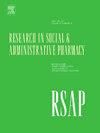慢性病患者与健康相关的生活质量与流感疫苗接种信念的关系
IF 3.7
3区 医学
Q1 PUBLIC, ENVIRONMENTAL & OCCUPATIONAL HEALTH
Research in Social & Administrative Pharmacy
Pub Date : 2025-03-22
DOI:10.1016/j.sapharm.2025.03.061
引用次数: 0
摘要
关于慢性疾病患者健康相关生活质量(HRQoL)的研究和对流感疫苗接种的看法尚缺乏。目的探讨慢性疾病男女患者身体和精神HRQoL维度与流感和流感免疫观念的关系。方法选取来自fo本文章由计算机程序翻译,如有差异,请以英文原文为准。
Associations of health-related quality of life with beliefs about influenza vaccination in people with chronic diseases
Background
Studies about health-related quality of life (HRQoL) and beliefs about influenza vaccination in people with chronic diseases are lacking.
Objective
To examine the association of physical and mental HRQoL dimensions with beliefs about influenza and influenza immunization among men and women who have chronic diseases.
Methods
A total of 295 community residents with chronic diseases from the Foča region (Republic of Srpska, Bosnia and Herzegovina) were included in the study. All participants were listed to receive free influenza vaccination. Interviews were conducted using the socio-demographic questionnaire, the SF-36 questionnaire and the modified Health Belief Model Applied to Influenza (HBMAI). The HBMAI domain scores were tested as the outcome variables.
Results
In men and women, a higher level of Body Pain and a lower level of Vitality, Social Functioning, Role Emotional, Mental Health, as well as poorer Physical and Mental Composite Scores were independently associated with more perceived Barriers to influenza immunization. In women, however, lower levels of Body Pain were independently associated with stronger Health Motivation. Furthermore, in women higher levels of Vitality, Social Functioning, Role Emotional, Mental Health and higher Mental Composite Scores were independently associated with stronger Cues to Action related to influenza immunization.
Conclusion
Poorer physical and mental HRQoL were associated with more perceived barriers to influenza vaccination. However, stronger physical and mental HRQoL in women were associated with stronger health motivation and cues to action. Health-related quality of life may play an important role in the perception of influenza vaccine among people with chronic diseases.
求助全文
通过发布文献求助,成功后即可免费获取论文全文。
去求助
来源期刊

Research in Social & Administrative Pharmacy
PUBLIC, ENVIRONMENTAL & OCCUPATIONAL HEALTH-
CiteScore
7.20
自引率
10.30%
发文量
225
审稿时长
47 days
期刊介绍:
Research in Social and Administrative Pharmacy (RSAP) is a quarterly publication featuring original scientific reports and comprehensive review articles in the social and administrative pharmaceutical sciences. Topics of interest include outcomes evaluation of products, programs, or services; pharmacoepidemiology; medication adherence; direct-to-consumer advertising of prescription medications; disease state management; health systems reform; drug marketing; medication distribution systems such as e-prescribing; web-based pharmaceutical/medical services; drug commerce and re-importation; and health professions workforce issues.
 求助内容:
求助内容: 应助结果提醒方式:
应助结果提醒方式:


